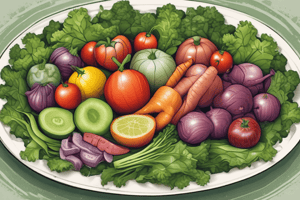Podcast
Questions and Answers
What is the primary source of energy for carnivores?
What is the primary source of energy for carnivores?
- Plant matter
- Insects
- Fruits and seeds
- Animal protein (correct)
Which of the following animals is considered a carnivore?
Which of the following animals is considered a carnivore?
- Venus flytrap (correct)
- Rabbit
- Horse
- Cow
Why do herbivores typically consume plant matter?
Why do herbivores typically consume plant matter?
- To rely on scavenging
- To obtain animal protein
- To meet their nutritional needs (correct)
- To derive energy from insects
Why would a human following a complete carnivore diet need to consume animal products?
Why would a human following a complete carnivore diet need to consume animal products?
What adaptation in herbivores allows them to process low-density foods?
What adaptation in herbivores allows them to process low-density foods?
Which dietary type involves consuming both plant matter and animal protein?
Which dietary type involves consuming both plant matter and animal protein?
Which of the following animals is classified as an omnivore?
Which of the following animals is classified as an omnivore?
Humans, being omnivores, can thrive on a diet that includes all of the following EXCEPT:
Humans, being omnivores, can thrive on a diet that includes all of the following EXCEPT:
Which of the following animals is NOT likely to be an omnivore?
Which of the following animals is NOT likely to be an omnivore?
What distinguishes an omnivore from a carnivore?
What distinguishes an omnivore from a carnivore?
Which of the following statements is true regarding omnivores?
Which of the following statements is true regarding omnivores?
Flashcards are hidden until you start studying
Study Notes
Diet Types: Carnivore, Herbivore, Omnivore
Different dietary needs have evolved throughout history as humans discovered new sources of food and developed new ways of preparing and preserving it. This has led to distinct categories of diets based on what animals eat. Here is a brief overview of the major diet types: carnivore, herbivore, and omnivore.
Carnivore
Carnivores are primarily meat-eating animals. They derive most if not all of their energy from animal protein, hunting, scavenging, or even stealing prey from other predators. Some examples of carnivorous plants include Venus flytraps, pitcher plants, and sundews. These organisms obtain nutrients by trapping insects and digest them using enzymes. However, humans cannot survive exclusively on plant-based proteins, so a human following a complete carnivore diet would need to consume sufficient amounts of essential amino acids and micronutrients through animal products.
Herbivore
Herbivores rely solely on plant matter, such as grass, leaves, fruit, and seeds, to meet their nutritional needs. Their teeth and digestive systems are adapted to process relatively low-density foods that must undergo fermentation before they can be converted into usable energy. Examples of common herbivores include cows, sheep, goats, rabbits, and horses. Humans also follow various forms of vegetarianism due to personal preference, ethical concerns, or health reasons. Though humans do require some protein, the primary source of protein in a well-balanced vegan diet is usually whole grains, legumes, nuts, and vegetables, which contain protein and many other healthy components in varying proportions.
Omnivore
Omnivores are animals that consume both plant and animal material. Many species display flexibility in their behavior regarding eating habits. Examples of omnivores include bears, raccoons, pigs, and humans. For humans, being an omnivore means having the ability to thrive on a wide variety of foods including fruits, vegetables, grains, meats, dairy products, and eggs.
In conclusion, while there are different dietary requirements among animals, humans share the unique ability to adapt and create varied diets. Understanding these diet types helps us appreciate the diversity of ways in which creatures around the world find sustenance.
Studying That Suits You
Use AI to generate personalized quizzes and flashcards to suit your learning preferences.




